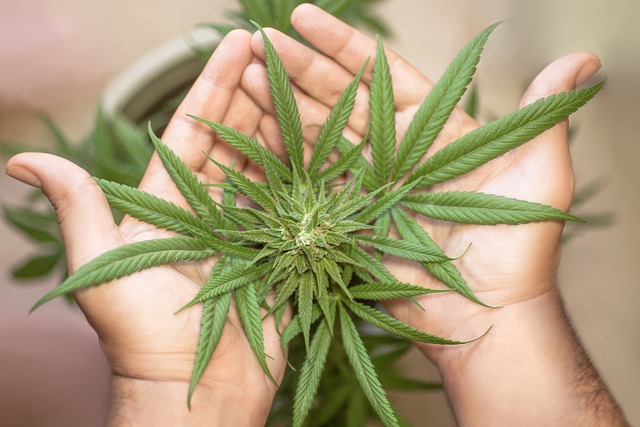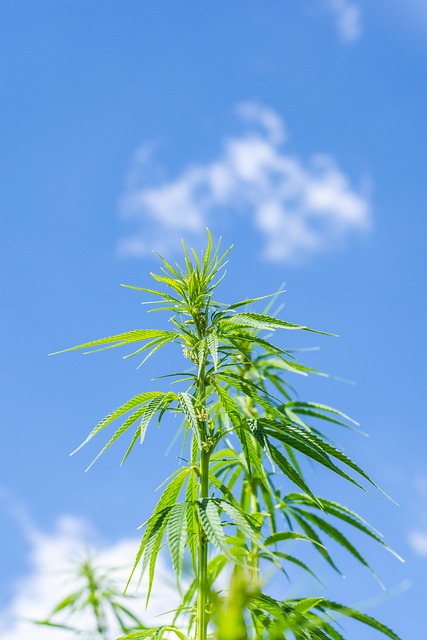Delta 9 THC gummies provide psychoactive effects that can induce euphoria and relaxation, which are beneficial for recreational use or managing conditions like pain and nausea. CBD gummies, on the other hand, do not produce psychoactive effects, making them suitable for those seeking therapeutic benefits such as reducing anxiety, improving sleep, and managing pain without altering their mental state. Delta 9 THC interacts with the endocannabinoid system to produce a range of experiences, while CBD influences various physiological processes for mood regulation and immune response. The choice between delta 9 bud and CBD bud hinges on whether one desires the psychoactive effects of delta 9 or the therapeutic benefits of CBD. When considering legal aspects, it's important to note that CBD products with less than 0.3% delta 9 THC are more accessible and legally acceptable in many regions. Users must weigh the medicinal efficacy of delta 9 against the non-intoxicating properties of CBD, considering both personal health needs and legal restrictions. Understanding the nuances between delta 9 bud and CBD bud is crucial for making informed decisions about cannabis use for wellness.
Delta 9 THC and CBD gummies offer distinct experiences in the realm of cannabinoid consumption, each with its own set of advantages and considerations. This article delves into the nuanced differences between these two popular edible formats, highlighting the unique effects, usage scenarios, and legal statuses of delta 9 bud versus CBD bud. We will explore the potent psychoactive properties of delta 9 gummies and their medical applications, as well as the non-intoxicating relief and wellness benefits associated with CBD gummies. Additionally, we will address the potential side effects, regulatory considerations, and the subtle effects available through both options. Whether you’re new to cannabinoid use or a seasoned user, this comparative analysis aims to inform your decision on which type of gummy best suits your needs.
- Exploring Delta 9 THC vs CBD Gummies: A Comparative Analysis of Effects and Usage
- Delta 9 Bud Advantages: Potency, Experience, and Medical Applications
- CBD Bud Benefits: Wellness, Legality, and Non-Intoxicating Relief
- The Downsides of Delta 9 Gummies: Side Effects, Psychoactive Properties, and Regulatory Considerations
- Understanding CBD Gummies: Subtle Effects, Broad Spectrum Options, and Accessibility
Exploring Delta 9 THC vs CBD Gummies: A Comparative Analysis of Effects and Usage

Delta 9 tetrahydrocannabinol (THC) and cannabidiol (CBD) are two prominent compounds found in the cannabis plant, each offering distinct effects and uses. Gummies infused with Delta 9 THC provide users with psychoactive effects, as Delta 9 is the form of THC most associated with the traditional ‘high’ cannabis is known for. These gummies can induce euphoria, relaxation, and altered perception, making them popular for recreational use or for managing pain, nausea, and other conditions where such effects are beneficial. The psychoactive nature of Delta 9 THC means it interacts with the endocannabinoid system differently than CBD, leading to a range of experiences from uplifting to sedating depending on the dosage and individual sensitivity.
On the other hand, CBD gummies do not produce psychoactive effects, making them a preferable option for those seeking the therapeutic benefits of cannabis without the ‘high’. These benefits include anxiety relief, improved sleep quality, and pain management. CBD’s interaction with the body’s endocannabinoid system is known to influence various physiological processes, including mood regulation and immune response. Unlike Delta 9 THC gummies, CBD gummies are often used during the day for their non-intoxicating properties and are favored by individuals who drug tests are a concern. The choice between Delta 9 THC and CBD gummies depends on the desired effect and personal preferences, with each offering a unique set of advantages tailored to specific needs or goals. When considering Delta 9 bud vs CBD bud, it’s essential to understand the legal status of these products in your region, as well as to consult with a healthcare professional before incorporating them into your wellness regimen.
Delta 9 Bud Advantages: Potency, Experience, and Medical Applications

Delta 9 THC, commonly found in cannabis as “delta 9 bud,” offers a distinct set of advantages that differentiate it from its non-psychoactive counterpart, CBD. One of the most notable benefits of delta 9 bud is its potency, which can be attributed to its psychoactive properties. Users often report a more pronounced and intense experience compared to CBD buds. This heightened effect can be particularly beneficial for medical applications, where patients seek relief from conditions like chronic pain, nausea, and appetite loss. The psychoactive nature of delta 9 not only provides symptomatic relief but also improves the overall well-being of users by inducing relaxation and euphoria. Additionally, delta 9 bud has been studied for its potential in treating a variety of medical conditions, including neurological disorders. Unlike CBD buds, which may offer therapeutic benefits without the high, delta 9 bud’s effects are more pronounced and can provide significant relief for those in need. Users also appreciate the variety of strains available, allowing them to tailor their experience to their specific needs or preferences. When comparing delta 9 bud vs CBD bud, it’s clear that while both have their place in the cannabis landscape, delta 9’s potency and medical applications make it a distinct choice for those seeking specific therapeutic effects.
CBD Bud Benefits: Wellness, Legality, and Non-Intoxicating Relief

Delta 9 gummies, often referred to as ‘bud’ in the context of edible cannabis products, offer a range of wellness benefits that have garnered significant attention. Unlike their psychoactive counterpart, delta 9 THC, these gummies contain CBD, which is non-intoxicating and has been lauded for its therapeutic properties. CBD buds, specifically, are rich in cannabidiol and are legal in many jurisdictions where they are derived from hemp with less than 0.3% delta 9 THC. This distinction in legality is a critical factor for consumers who seek the health benefits of cannabis without the concern of violating laws.
The wellness aspect of CBD buds is one of their most compelling pros. Users often report relief from anxiety, chronic pain, and various other conditions. The non-intoxicating nature of CBD ensures that users can reap the therapeutic effects while remaining clear-headed and functional throughout the day. Additionally, unlike delta 9 THC, CBD does not have the potential to impair cognitive functions or motor skills, making it a safer option for those who need to manage pain or anxiety during active days. The legality of CBD buds also ensures that consumers can access these products without the risk of legal repercussions associated with higher-THC products in regions where cannabis is not fully legalized.
The Downsides of Delta 9 Gummies: Side Effects, Psychoactive Properties, and Regulatory Considerations

Delta 9 gummies, which contain tetrahydrocannabinol (THC) in its most natural form, offer a range of effects distinct from those of cannabidiol (CBD) products. While these gummies can be effective for managing pain, stimulating appetite, and providing relief for various conditions due to their psychoactive properties, they come with a set of downsides that users must consider. The psychoactive nature of delta 9 THC can lead to side effects such as anxiety, paranoia, impaired motor skills, and altered perception, which can be particularly disconcerting for inexperienced users or those sensitive to its effects. Additionally, the psychoactive properties can induce a ‘high,’ which may impair one’s ability to perform tasks that require attention and coordination.
Regulatory considerations further complicate the use of delta 9 gummies. Unlike CBD products, which have been federally legalized in many countries under certain conditions, delta 9 THC remains subject to stricter regulations due to its psychoactive nature. This means that users must navigate varying state laws and potentially face legal implications if traveling across state lines or internationally with these products. The legal landscape for delta 9 gummies is constantly evolving, making it imperative for consumers to stay informed about the current status of their local laws. Comparatively, CBD buds, which contain cannabidiol, offer a non-psychoactive alternative that has gained widespread acceptance due to its therapeutic properties without the mind-altering effects of delta 9 THC. Users considering the use of gummies for wellness or medical purposes should carefully weigh the benefits against these significant downsides and legal constraints.
Understanding CBD Gummies: Subtle Effects, Broad Spectrum Options, and Accessibility

Delta 9 gummies have gained popularity as a consumer-friendly way to ingest cannabinoids, offering a discreet and enjoyable method for both therapeutic and recreational purposes. Unlike their THC counterpart, delta 9 bud, which contains the psychoactive tetrahydrocannabinol (THC) that induces the “high” associated with cannabis, CBD gummies are derived from hemp and contain cannabidiol (CBD), a non-psychoactive compound. This distinction is crucial for those seeking the potential health benefits of cannabinoids without the mind-altering effects.
The subtle effects of delta 9 CBD gummies stem from their interaction with the body’s endocannabinoid system, which plays a role in regulating pain, inflammation, and anxiety, among other functions. Users often report a sense of calm and well-being without impairment, making them suitable for use during the day. Additionally, the availability of broad spectrum options allows consumers to benefit from a range of cannabinoids and terpenes found in the hemp plant, which may work synergistically to enhance the therapeutic effects, a concept known as the entourage effect. This variety ensures that there’s an option for almost every preference and need. Moreover, the accessibility of CBD gummies has been amplified with their legal status in many regions, unlike delta 9 bud which is subject to stricter regulations due to its THC content. This ease of access makes CBD gummies a convenient choice for those looking to explore the benefits of cannabinoids.
When considering the use of Delta 9 THC versus CBD gummies, it’s clear that each offers distinct advantages and potential drawbacks. Delta 9 bud presents a high potency option for those seeking an intoxicating experience with various medical applications, while CBD bud provides a non-intoxicating alternative that supports wellness and is often more accessible legally. The choice between these two options hinges on individual needs and preferences. It’s crucial to weigh the benefits of Delta 9’s potency and psychoactive effects against its side effects and regulatory considerations. Conversely, CBD gummies offer subtle effects that cater to a broad spectrum of users, emphasizing their therapeutic potential without intoxication. Both have their merits, and discerning consumers should approach them with informed decision-making based on personal health goals and legal frameworks. Ultimately, the decision between Delta 9 bud and CBD bud is a personal one that should be made with careful consideration of the pros and cons each brings to the table.
